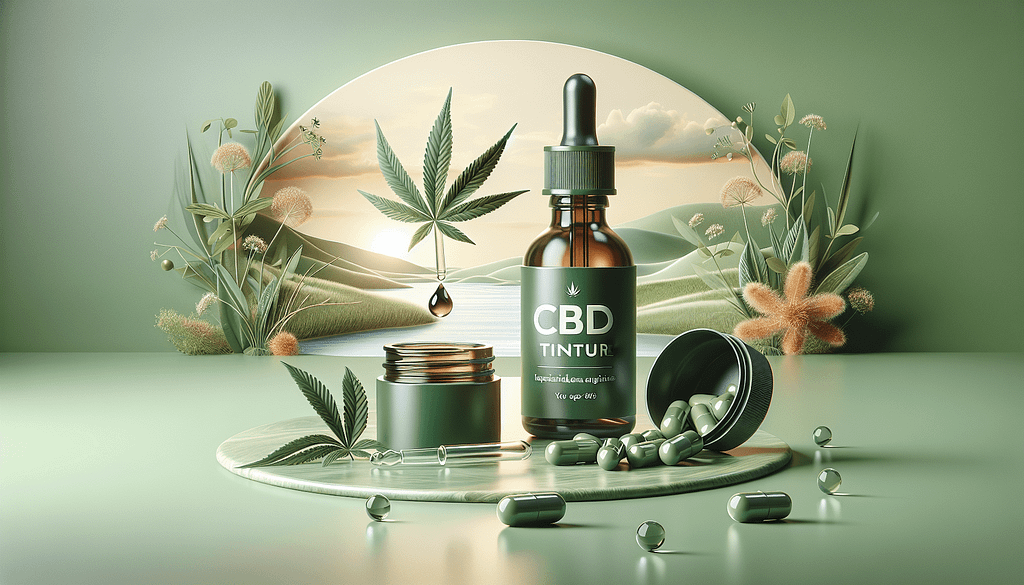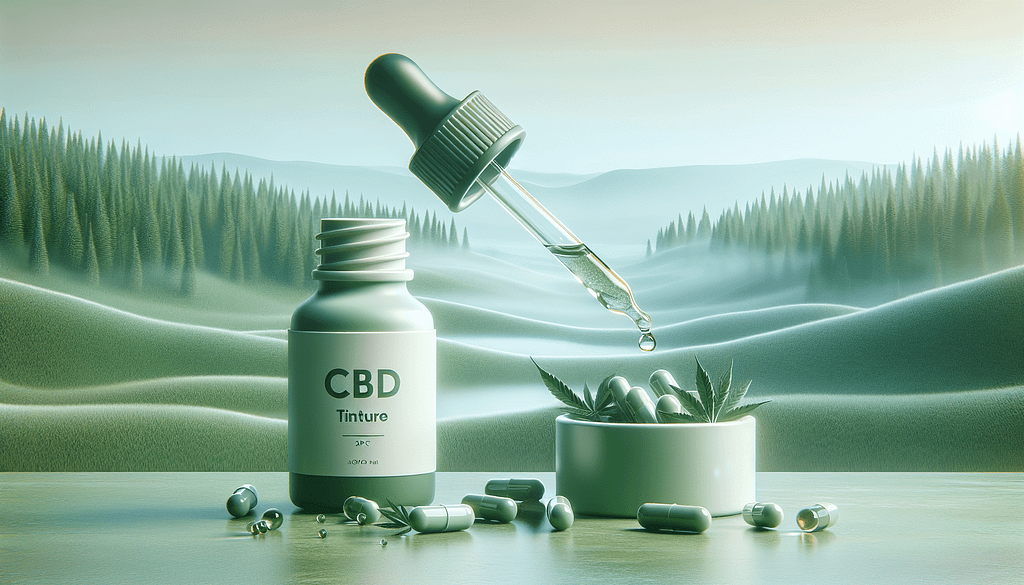As an Amazon Associate I earn from qualifying purchases.
Curious about CBD products? Learn the pros and cons of CBD tinctures vs. capsules to determine which is best suited for your needs and lifestyle. Read more!
CBD Tinctures vs. Capsules: Which is Better for You?
Cannabidiol, commonly known as CBD, has become one of the most popular natural remedies used for many common ailments. As you embark on your CBD journey, you’ll soon realize that the market offers a wide array of options to choose from. Two of the most popular CBD products are tinctures and capsules. But which one is better for you? This article aims to help you navigate through the pros and cons of both, giving you the information you need to make an informed decision.
What are CBD Tinctures?
The Basics of CBD Tinctures
CBD tinctures are liquid extracts of CBD that are combined with a carrier oil like coconut or hemp seed oil. These tinctures are usually housed in small glass bottles with droppers, allowing you to easily measure out your dosage. The liquid form facilitates faster absorption when taken sublingually (under the tongue), making tinctures a popular choice for those looking for quick relief.
How to Use CBD Tinctures
Using CBD tinctures is fairly straightforward. Simply fill the dropper with the desired amount of tincture and place it under your tongue. Hold it there for about 60 seconds before swallowing. This method allows the CBD to be absorbed directly into your bloodstream through the mucous membranes in your mouth, leading to quicker onset compared to other methods like edibles.
Pros of CBD Tinctures
- Quick Absorption: Due to the sublingual method, CBD tinctures are absorbed quickly into the bloodstream, providing faster relief.
- Adjustable Dosage: The dropper allows you to easily adjust the amount of CBD you’re taking, making it easier to find your optimal dosage.
- Versatility: You can add tinctures to your food or beverages, giving you more options for consumption.
Cons of CBD Tinctures
- Taste: Some people find the natural taste of CBD tinctures to be unpleasant, although flavored options are available.
- Convenience: Carrying a glass bottle around might not be as convenient as popping a capsule, especially for on-the-go use.
What are CBD Capsules?
The Basics of CBD Capsules
CBD capsules are pre-measured doses of CBD enclosed in a digestible casing, often made from gelatin or a plant-based alternative. They look much like any other supplement pill you might take, and they offer a discreet and straightforward way to consume CBD. Capsules usually contain CBD isolate or full-spectrum CBD, giving you a range of options to choose from.
How to Use CBD Capsules
Using CBD capsules couldn’t be simpler. Just take one with a glass of water, much like you would with any other pill or supplement. The CBD is then absorbed through your digestive system, which usually takes longer than sublingual absorption, but offers a steady release of CBD over time.
Pros of CBD Capsules
- Convenience: Capsules are easy to carry around and consume, making them a hassle-free option for busy lifestyles.
- No Taste: Since the CBD is enclosed within the capsule, you won’t have to deal with the natural taste of CBD oil.
- Pre-Measured Dosages: Each capsule has a fixed amount of CBD, making it easier to track and maintain your dosage.
Cons of CBD Capsules
- Slower Absorption: Because the CBD has to go through your digestive system, it takes longer for the effects to kick in compared to tinctures.
- Less Customizable Dosages: Unlike tinctures, you can’t easily adjust the amount of CBD you take with capsules.

Comparing Bioavailability: Tinctures vs. Capsules
What is Bioavailability?
Bioavailability refers to the proportion of a substance that enters the bloodstream when introduced into the body and is thus available for use or storage. It’s an important factor to consider when comparing different methods of taking CBD because it determines how much of the compound will actually have an effect on your body.
Bioavailability of CBD Tinctures
CBD tinctures have a relatively high bioavailability because they are absorbed directly into the bloodstream through the mucous membranes under the tongue. This bypasses the digestive system, which can degrade some of the CBD before it gets absorbed.
Bioavailability of CBD Capsules
CBD capsules generally have lower bioavailability compared to tinctures because they must pass through your digestive system. Enzymes in the stomach and liver can break down some of the CBD before it enters the bloodstream, reducing the overall effectiveness.
Which is More Effective?
If you’re looking for immediate relief, tinctures might be the better choice due to their high bioavailability and quick absorption rate. However, if you’re seeking sustained, long-term effects, capsules can be more effective as they release CBD steadily over time.
Convenience and Lifestyle Considerations
On-the-Go Usage
If you have a busy lifestyle and need something that is easy to take while you’re on the move, CBD capsules are the clear winner. Their discreet form and ease of use make them the perfect choice for people who travel frequently or need to take their CBD in public settings.
Customizing Your Dosage
For those who need to fine-tune their CBD dosage, tinctures offer more flexibility. The dropper allows you to measure out specific amounts, making it easier to find the dosage that works best for you. Capsules, on the other hand, come in predetermined doses, which can limit your ability to customize.
Taste and Digestive Comfort
If you’re sensitive to taste or have a compromised digestive system, these factors could influence your decision. Tinctures can have a strong, earthy taste that might not be for everyone, whereas capsules are tasteless. However, if you have digestive issues, the prospect of swallowing a capsule might be less appealing.

Cost Comparison
Price of Tinctures
CBD tinctures can vary widely in price, depending on the brand, quality, and concentration of CBD. High-quality tinctures with higher concentrations of CBD tend to be more expensive. However, because tinctures allow for adjustable dosages, you might find that you use less product over time compared to capsules.
Price of Capsules
Similarly, the cost of CBD capsules can range significantly. Capsules tend to be a bit more expensive per milligram of CBD than tinctures, but the convenience they offer can make up for the higher cost. Plus, with pre-measured doses, you’re less likely to accidentally overuse the product.
Which Provides Better Value?
When evaluating value, consider not only the price but also how long each product will last given your daily dosage. Tinctures might offer better value if you need to adjust your dosage frequently. Capsules, with their no-mess, no-fuss convenience, might justify their higher cost for those who prioritize ease of use.
Health Benefits and Uses
General Health Benefits
Both CBD tinctures and capsules offer a range of health benefits, including relief from pain, anxiety, and inflammation. Users have reported improvements in sleep quality, a reduction in chronic pain, and a boost in overall wellness.
Specific Uses for Tinctures
Due to their quick absorption rate, tinctures are particularly effective for acute issues like sudden anxiety attacks or breakthrough pain. Athletes and people with active lifestyles may also prefer tinctures for their rapid onset and flexibility in dosage.
Specific Uses for Capsules
Capsules are a great option for conditions that require consistent, long-term management, such as chronic pain or insomnia. The slow, steady release of CBD can help maintain a stable level of the compound in your bloodstream, making capsules ideal for ongoing issues.
Potential Side Effects
Side Effects of Tinctures
While generally well-tolerated, CBD tinctures can have side effects, especially if you take a high dose. Some users might experience dry mouth, dizziness, or changes in appetite. Because tinctures are absorbed quickly, you might feel these side effects sooner compared to capsules.
Side Effects of Capsules
The side effects of CBD capsules are similar to those of tinctures but might take longer to manifest due to the slower absorption rate. Additionally, because capsules pass through your digestive system, they might cause digestive discomfort in some individuals.
How to Minimize Side Effects
To minimize side effects, it’s always a good idea to start with a low dose and gradually increase it as your body gets accustomed to CBD. Consulting with a healthcare professional can provide personalized advice and help you navigate any potential issues.
Verdict: Which is Better for You?
Factors to Consider
Choosing between CBD tinctures and capsules depends largely on your specific needs, lifestyle, and personal preferences. Here are some key factors to consider:
- Immediate Relief vs. Long-term Management: Tinctures offer faster relief, while capsules provide a steady release.
- Convenience: Capsules are easier for on-the-go use.
- Dosage Customization: Tinctures offer more flexibility.
- Taste Sensitivity: Capsules are tasteless, making them easier for those sensitive to flavors.
Making Your Decision
If you’re looking for quick, flexible doses and don’t mind the taste, CBD tinctures could be the best choice for you. On the other hand, if you prioritize convenience and consistent dosing, CBD capsules might be more suitable.
Final Thoughts
CBD tinctures and capsules each have their own unique advantages and disadvantages. The best product for you will depend on your individual needs and lifestyle. By understanding the differences in how they are used, how they affect the body, and how convenient they are, you can make an informed decision that will help you get the most out of your CBD experience.
Thank you for reading! If you found this article helpful, please clap, leave a comment, and subscribe to our Medium newsletter for more updates.
Disclosure: This story incorporates AI assistance for content creation.
Amazon and the Amazon logo are trademarks of Amazon.com, Inc, or its affiliates.
